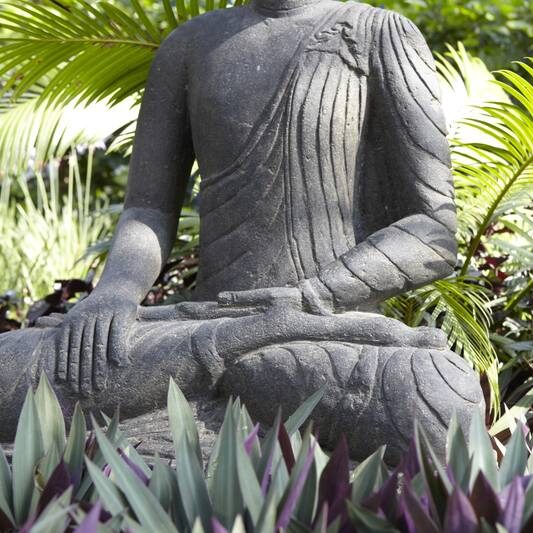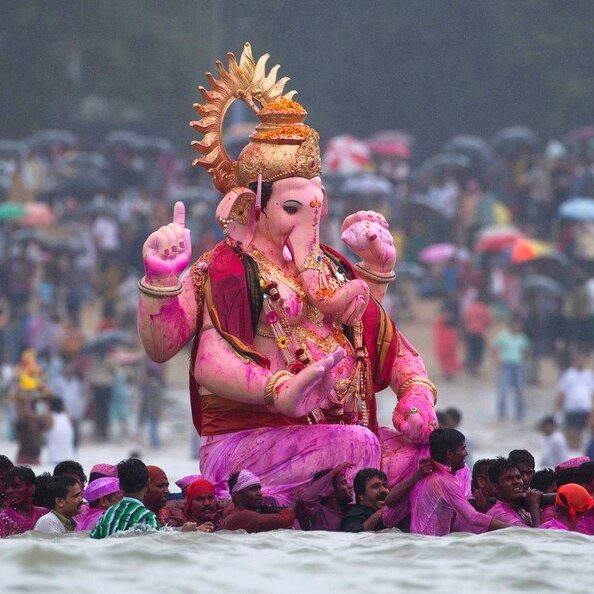One common question we receive is whether the philosophy of yoga can align with different religions. In this article, we’ll explore various belief systems and examine how yoga philosophy can harmonize with each.
But before we dive into it, we’d like to quickly share our perspective on yoga and religion . . .
At Blue Osa, we warmly embrace inclusivity and celebrate the beautiful tapestry of religions and philosophies that make up our global community; we recognize the invaluable inspiration and enrichment religion and philosophy can offer to people’s lives.
In a world of diverse spiritual beliefs, each with unique (yet also remarkably similar) teachings and perspectives, we steer clear of contentious religious debates. Instead, our unwavering focus is on embracing the philosophies that weave our global community together, enriching our cultures and fostering understanding.
Blue Osa has its own philosophy steeped in the rituals of the yoga tradition. We warmly welcome individuals of all races, creeds, and religious backgrounds.

We recognize that religious beliefs are fundamental to people’s daily lives, embodying profound significance. This diversity is something we celebrate!
No one thought could resonate with every person in the world, and many religions are similar when you compare the general aspects, so here we look at the “bare essentials” of a few different schools of thought, beliefs, and ethics.
In examining different spiritual religions, we aim to explore the core principles that underpin different belief systems, shedding light on their shared fundamental aspects — and illuminating how yoga can fit in with each belief.
Through this exploration, we can discover the common threads that connect us all on our unique paths toward spiritual growth and enlightenment. Let’s dive in.
What is a religious belief?
Let’s start with a fundamental definition:
A religious belief refers to an individual’s acceptance and adherence to a set of principles, doctrines, rituals, and values associated with a particular religion or spiritual tradition.
It encompasses one’s faith, trust, and conviction in the existence of a higher power, as well as the practices and teachings that guide one’s understanding of the universe, human existence, morality, and the purpose of life.
Religious beliefs often shape a person’s worldview, moral framework, behaviors, and actions within the context of their faith community. They can vary significantly across different religions and can be profoundly personal and influential in shaping an individual’s identity and sense of meaning and purpose.
What is the philosophy of yoga?
The philosophy of yoga is a comprehensive system of principles and teachings that guide the practice and understanding of yoga as a holistic discipline.
Rooted in ancient Indian traditions, yoga philosophy encompasses various philosophical frameworks, including those found in classical texts such as the Yoga Sutras of Patanjali, the Bhagavad Gita, and the Upanishads.
At its core, yoga philosophy aims to facilitate self-realization, personal transformation, and spiritual development. It explores the nature of reality, the human condition, and the interconnectedness of all beings.
In recent years, the relationship between yoga and religion has sparked controversy, with some asserting that yoga’s roots in Hinduism conflict with other faiths and should be excluded from secular settings like schools.
However, yoga is not a structured belief system and does not impose specific religious requirements; it is accessible to individuals of all religions and cultures.
While yoga holds connections to spirituality, it is inclusive and non-prescriptive in nature.
You can read more about the relationship between yoga and religion here.
Here’s the bottom line about yoga and religion:
Religion typically refers to organized belief systems centered around deities, rituals, and moral codes, often involving a community. Yoga, on the other hand, is a spiritual practice originating from ancient India, encompassing physical postures, breath control, meditation, and ethical principles, aimed at self-realization and unity of mind, body, and spirit.
P.S. Did you know the history of yoga never mentions stretching? It’s true: yoga and stretching are not the same thing. Learn more about the true history of yoga here.
Different Philosophies and Religions At A Glance
So, how many religions are there?
Well, the truth is that it’s difficult to provide an exact number as the concept of religion can vary across cultures and individuals. There are numerous religious traditions and belief systems worldwide, ranging from major organized religions to indigenous and local practices.
While not an exhaustive list, this overview of different philosophies and religions offers a fascinating glimpse into the vibrance of human spirituality and shows how the philosophy of yoga can fit within each.
The diversity and number of religions reflect the wide range of human spiritual and philosophical expressions found throughout history and across different societies!
Buddhism
At the heart of Buddhism lies a profound emphasis on personal spiritual growth, striving for enlightenment inspired by the enlightened figure, Buddha.
Buddhists embrace the eternal nature of life, believing in the cycle of reincarnation and experiencing the three fundamental aspects of existence: transiency, suffering, and selflessness.
Guided by the Four Noble Truths, Buddhism teaches that suffering is inherent, arising from attachment to desires.

And yet, freedom from suffering can be attained by following the Eightfold Path, which entails cultivating morality, meditation, and wisdom. Ultimately, as our attachment to desire diminishes, suffering ends.
Buddhism, probably more than other spiritual practices and beliefs, embraces meditation as a path to enlightenment. This reflective practice allows individuals to deepen their understanding of the nature of reality and their minds.
Compassion and loving-kindness are fundamental values in Buddhism, and practitioners are encouraged to cultivate empathy, kindness, and a sense of interconnectedness with all living beings.
Buddhism also encompasses various rituals and practices across different traditions and cultures. These may include chanting, prostrations, offerings, and the veneration of Buddhas and bodhisattvas.
Ultimately, Buddhism is a dynamic and multifaceted tradition that offers profound insights into the human condition, provides practical guidance for ethical living, and offers a path toward awakening and liberation from suffering.
Christianity
Christianity is a monotheistic religion centered around the life, teachings, death, and resurrection of Jesus Christ, believed to be the Son of God and the savior of humanity. It encompasses diverse beliefs and practices but is united by faith in Jesus as the pathway to salvation and eternal life.
The teachings of Jesus reverberate with healing, forgiveness, and boundless love. Jesus’s miracles, acts of healing, and his ultimate sacrifice on the cross stood as a testament to his love for all humanity, a divine gift from God.
Central to his teachings were two profound commandments: to love God and to love one’s neighbor as oneself.
Forgiveness held significant importance within the Christian faith, mirroring Jesus’s profound capacity to love and forgive as God does with his children. To live as Jesus did means to embody love and extend forgiveness, reflecting the divine essence within oneself.
Overall, the teachings of Jesus form a profound foundation for the Christian faith, emphasizing love, forgiveness, humility, and the pursuit of spiritual perfection.
Within the umbrella of Christianity are three major denominations: Catholicism, Protestant, and Eastern Orthodox.
Catholicism distinguishes itself from other forms of Christianity through its unwavering commitment to tradition, the sacraments, mediation between God, and communion. Several key principles mark it.
Firstly, full communion holds utmost importance, emphasizing a deep connection to the teachings of the Church and unity with Rome.

Catholics believe that attaining the happiness of heaven necessitates esoteric knowledge, love, and service to God, facilitated through Jesus, divine grace, and God’s gift of salvation.
The belief in the Blessed Trinity—the Father, the Son, and the Holy Spirit—holds significant theological importance within Catholicism.
Protestantism is a diverse branch of Christianity that emerged during the 16th-century Reformation. It emphasizes the authority of Scripture, salvation by faith alone, and the priesthood of all believers.
Eastern Orthodoxy, on the other hand, traces its origins to the early Christian church in the Eastern Roman Empire. It places great importance on tradition, liturgy, and mysticism.
Bishops lead the Eastern Orthodox Church, and its theological teachings emphasize theosis, the process of becoming united with God’s divine nature. Iconography and the veneration of saints play significant roles in Orthodox worship and spirituality.
Islam
Muslims, followers of the Islamic faith, believe in Allah as the one true God.
Central to Islam is the Five Pillars; these encompass the declaration of faith in Allah and Muhammad as God’s messenger, the observance of ritual prayers five times a day, fasting and self-control during Ramadan, giving a portion of savings to the poor and needy, and undertaking the pilgrimage to Mecca at least once in a lifetime.

In addition to the Five Pillars, Islam holds six core beliefs. These include believing in Allah as God and rejecting the concept of the Trinity, divine sonship, or partnership. Allah is eternal, omniscient, omnipotent, just, without shape or form, and deserving of sole worship.
Muslims also believe in the existence of honored angels and the importance of the Holy Books, which Allah revealed to his messengers for guidance. Prophets, including Adam and Muhammad, are seen as human, not divine.
The philosophy of yoga, focusing on self-discipline, mindfulness, ethical behavior, and spiritual growth, can complement the principles of Islam by promoting inner peace, self-awareness, and a deeper connection with Allah (God) while respecting Islamic teachings and practices.
Hinduism
Continuing our exploration of different types of religion is Hinduism. The predominant religion of India is characterized as a diverse collection of intellectual and philosophical perspectives rather than a rigid set of shared beliefs.
It revolves around the concept that our beliefs shape our thoughts, attitudes, actions, and ultimately our destiny, emphasizing the need for intentional and conscious thinking.
Referred to as the oldest religion, the eternal law, or Sanatana Dharma, Hinduism upholds absolute freedom of belief and worship. It recognizes the world as a unified family, venerating the universal truth and embracing all forms of ideas while disregarding distinct religious labels.

Hinduism has several essential beliefs and is perhaps most intertwined with the philosophy of yoga:
- Belief in Brahman, the supreme spirit, can involve devotion to a single deity while acknowledging the existence of others. The specifics of God are not essential, although many Hindus revere principal gods like Shiva, Vishnu, or Shakti, recognizing them as manifestations of a single reality.
- The true self, known as the atman, is eternal and separate yet identical to Brahman.
- The authority of the Vedas, the oldest sacred texts of India, and the Brahmans, the priestly class.
- The concept of reincarnation is where an enduring soul transmigrates from one body to another after death.
- The law of karma determines one’s destiny in this life and the next based on the accumulated actions and their consequences.
Confucianism
Confucianism is a philosophical and ethical system that originated in ancient China, developed by the Chinese philosopher Confucius (Kongzi). It emphasizes moral values, social harmony, and the cultivation of virtues to create an ideal society.
At the essence of Confucianism are the teachings of Confucius, which revolve around the concept of ren (benevolence) and the pursuit of moral excellence.
Confucianism places great importance on filial piety, respect for elders, and the five primary relationships: ruler and subject, father and son, husband and wife, elder brother and younger brother, and friend and friend.
The ultimate goal of Confucianism is to establish a harmonious society based on ethical principles, proper social conduct, and the cultivation of virtuous individuals. Confucian teachings have profoundly influenced East Asian cultures, shaping social structures, family values, and ethical norms for centuries.
Taoism
Taoism, also known as Daoism, is a philosophical and spiritual tradition that originated in ancient China. It centers around the concept of Tao, which can be translated as “the way” or “the path.”
Taoism encourages individuals to live in harmony with the Tao, which is believed to be the fundamental force underlying all existence. It emphasizes spontaneity, simplicity, and naturalness, urging individuals to align themselves with the universe’s flow and live by its principles.
One of the critical teachings of Taoism is the idea of wu-wei, often translated as “non-action” or “effortless action.” It suggests that individuals can achieve greater harmony and effectiveness in their lives by relinquishing excessive control.

Taoism also strongly emphasizes nature and the interconnectedness of all things. It encourages people to observe and learn from the rhythms of the natural world, recognizing life’s inherent balance and cycles.
Taoism has significantly influenced Chinese culture, art, medicine, and martial arts. It promotes a holistic worldview, emphasizing the balance between yin and yang and the pursuit of inner peace and harmony with the natural order of things.
Stoicism
Stoicism is a philosophical school of thought that originated in ancient Greece and later flourished in ancient Rome. It offers practical wisdom and guidance on leading a virtuous and fulfilling life, regardless of external circumstances.
Stoicism believes that individuals should focus on what they can control, namely their thoughts, attitudes, and actions. It teaches that virtue, reason, and moral excellence are the keys to attaining inner tranquility and living in accordance with nature.
Stoicism encourages individuals to cultivate wisdom, courage, self-discipline, and justice. It emphasizes the importance of living by one’s principles and accepting the universe’s natural order.
The philosophy of yoga and Stoicism share common ground by emphasizing self-awareness, self-mastery, inner peace, and ethical conduct, which can complement each other in promoting a balanced and virtuous life while embracing mindfulness, resilience, and a harmonious relationship with oneself and the world.
Does yoga philosophy believe in God?
Whether or not yoga philosophy believes in God depends on the individual practitioner and the particular school of thought they follow. Yoga can be practiced by people with diverse religious and spiritual beliefs, as well as those who do not identify with any specific religion.
Why is yoga a philosophy?
Yoga is considered a philosophy because it encompasses more than just physical exercise or postures (asanas). It is a comprehensive system that addresses various aspects of human existence, including ethics, psychology, spirituality, and the pursuit of self-realization.
Yoga philosophy provides a framework for understanding the human condition and offers practical tools and techniques for personal growth, self-discovery, and inner transformation. It emphasizes self-discipline, self-study, mindfulness, ethical behavior, and the cultivation of virtues such as compassion, truthfulness, and non-violence.
Why should we study yoga philosophy?
Studying yoga philosophy can offer a range of benefits and enrich various aspects of our lives. Here are some reasons why studying yoga philosophy can be valuable:
- Deepening understanding: The philosophy of yoga provides a comprehensive framework for understanding the nature of reality, the human experience, and the mind-body connection. By studying yoga philosophy, we gain insights into profound philosophical concepts and gain a deeper understanding of ourselves and the world around us.
- Personal Growth: The philosophy of yoga offers practical tools and techniques for personal growth and self-improvement. It provides guidance on ethical behavior, self-discipline, mindfulness, and self-study. By applying these principles in our daily lives, we can cultivate positive qualities, develop inner strength, and improve our relationships with ourselves and others.
- Spiritual Exploration: The philosophy of yoga explores the nature of consciousness, the self, and the spiritual dimensions of life. It offers pathways to self-realization, enlightenment, and transcendence. By studying yoga philosophy, we can embark on a journey of spiritual exploration, deepen our connection to something greater than ourselves, and find meaning and purpose in our lives.
- Enhancing Yoga Practice: The philosophy of yoga provides a broader context and understanding of the practices and techniques involved in yoga. It helps us connect the physical postures (asanas), breath control (pranayama), meditation, and other yogic practices to their underlying philosophical principles.
- Stress Reduction and Well-being: The philosophy of yoga emphasizes mindfulness, meditation, and relaxation techniques that promote stress reduction and overall well-being. By studying yoga philosophy, we can learn valuable techniques for managing stress, finding inner peace, confronting our fears, and improving our mental and emotional well-being.
- Cultural Appreciation: The philosophy of yoga has deep roots in ancient Indian traditions and culture. By studying yoga philosophy, we can develop a greater appreciation and understanding of the historical and cultural context from which yoga emerged.
Ultimately, studying yoga philosophy allows us to go beyond the physical aspects of yoga and delve into its profound wisdom, practical teachings, and transformative potential. It can enrich our lives, broaden our perspectives, and guide us on a path of personal growth, self-discovery, and inner transformation.
Ready to learn more about the philosophy of yoga and how this ancient spiritual practice can enhance your life?
Then our yoga teacher training programs might be for you. Our students call them “transformational” and “life-changing” for a reason — it would be our honor to support you on your journey, too.









